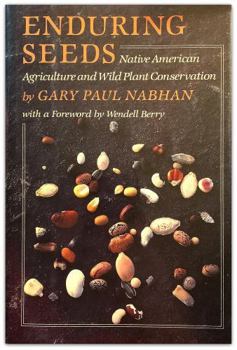Enduring Seeds: Native American Agriculture and Wild Plant Conservation
Select Format
Select Condition 
Book Overview
'A gem of a book: scientifically sound, ethical, full of interesting and timely information about one of the paramount yet neglected environmental issues of our times.' --Garden
Format:Hardcover
Language:English
ISBN:0865473439
ISBN13:9780865473430
Release Date:January 1989
Publisher:North Point Press
Length:225 Pages
Weight:1.14 lbs.
Customer Reviews
1 rating
Things we need to heed!
Published by Thriftbooks.com User , 23 years ago
Paul Nabhan's latest book is a delight to read. His clear writing style and effective way of illustrating important points gives the reader a pleasant break from the more technical books on the topic of seed evolution and dispersion. But don't be deceived by its ease of reading, the book is full of facts about early native agricultural practices in North and Central America, contains warnings about our loss of natural vegetation, especially rain forests, and tells of our rapid loss of plant diversity. Dr. Nabhan is the cofounder of an organization called Native Seeds and is currently Assistant Director of the Desert Botanical Garden in Phoenix, Arizona. In these dual roles he has had ample opportunity to observe what is happening to our natural vegetation and to record how the diversity of plants in our world continues to shrink at an alarming rate. His book is divided into a series of chapters each with names intended to draw the reader's interest. Examples include: "Turning Foxholes into Compost Heaps," "Drowning in a Shallow Gene Pool," and "Invisible Erosion." Each of his 12 chapters focuses on an important point. The first one presents an interesting history of plant evolution from the earliest Paleozoic times through the late Cenozoic and explains how the large, plant gene pool created the wonderful diversity we have all come to enjoy. In the next several chapters Dr. Nabhan first addresses the great diversity of plants found in forests of the wet and dry tropics and next speaks about how this great diversity led to the emergence of many cultigens we now depend upon for our staples. He also points with alarm to how rapidly this diversity is being lost as large areas are converted to agricultural lands or are clear cut for their lumber. Other chapters focus on the need for saving examples of seeds from plants that are becoming extinct and the advantages in tropical areas of using local plant species and local farming techniques instead of introduced hybrid plants and "modern" agricultural techniques. In later chapters Dr. Nabhan chronicles the demise of wild rice in the Great Lakes region, the near loss of a species of rare gourd in Florida, and why the production of maize in many areas of the northern Great Plains is not nearly as great today as it was in past generations. Finally, he offers a word of caution to plant geneticists saying that they could learn a lot from looking at the problems associated with the raising of domestic turkeys. The main theme of Dr. Nabhan's book focuses on the need for plant diversity and how the maintaining of a wide gene pool for each species is critical for the survival of each species. All of this, he cautions, has direct effects upon mankind because many of these plants form elements of our primary food supply. Throughout the book the author inserts brief warnings for the reader to ponder. On page 27, for example, the author notes the prevailing attitude among many plant geneticists. He quotes one of






